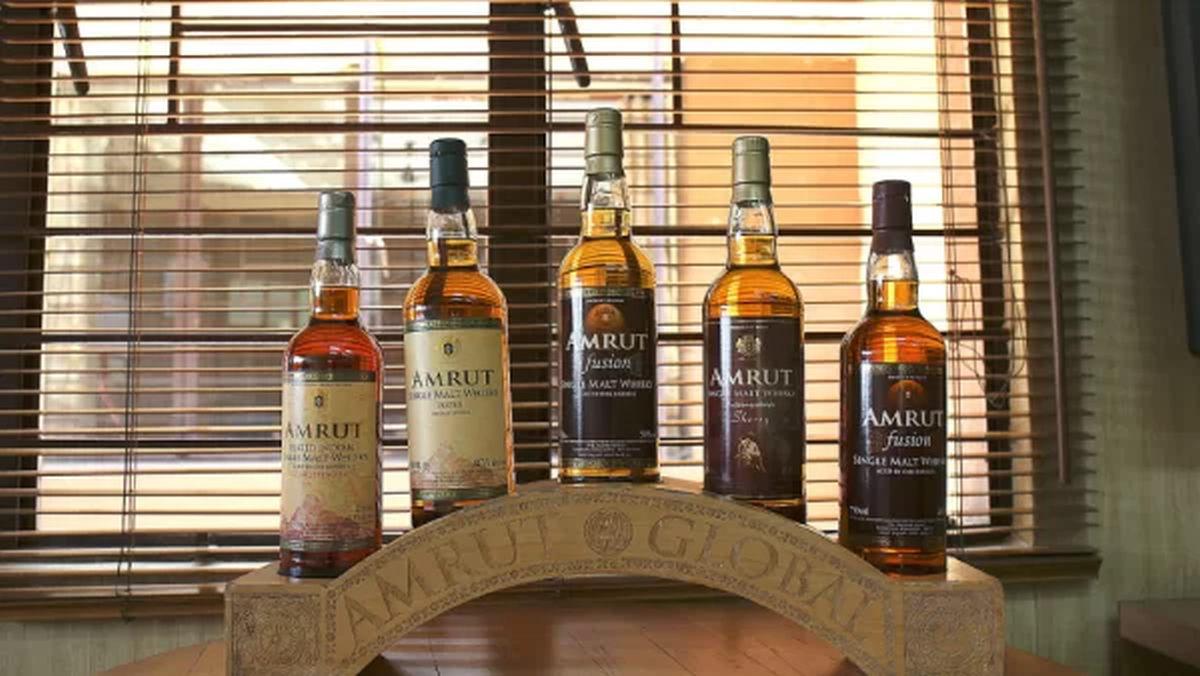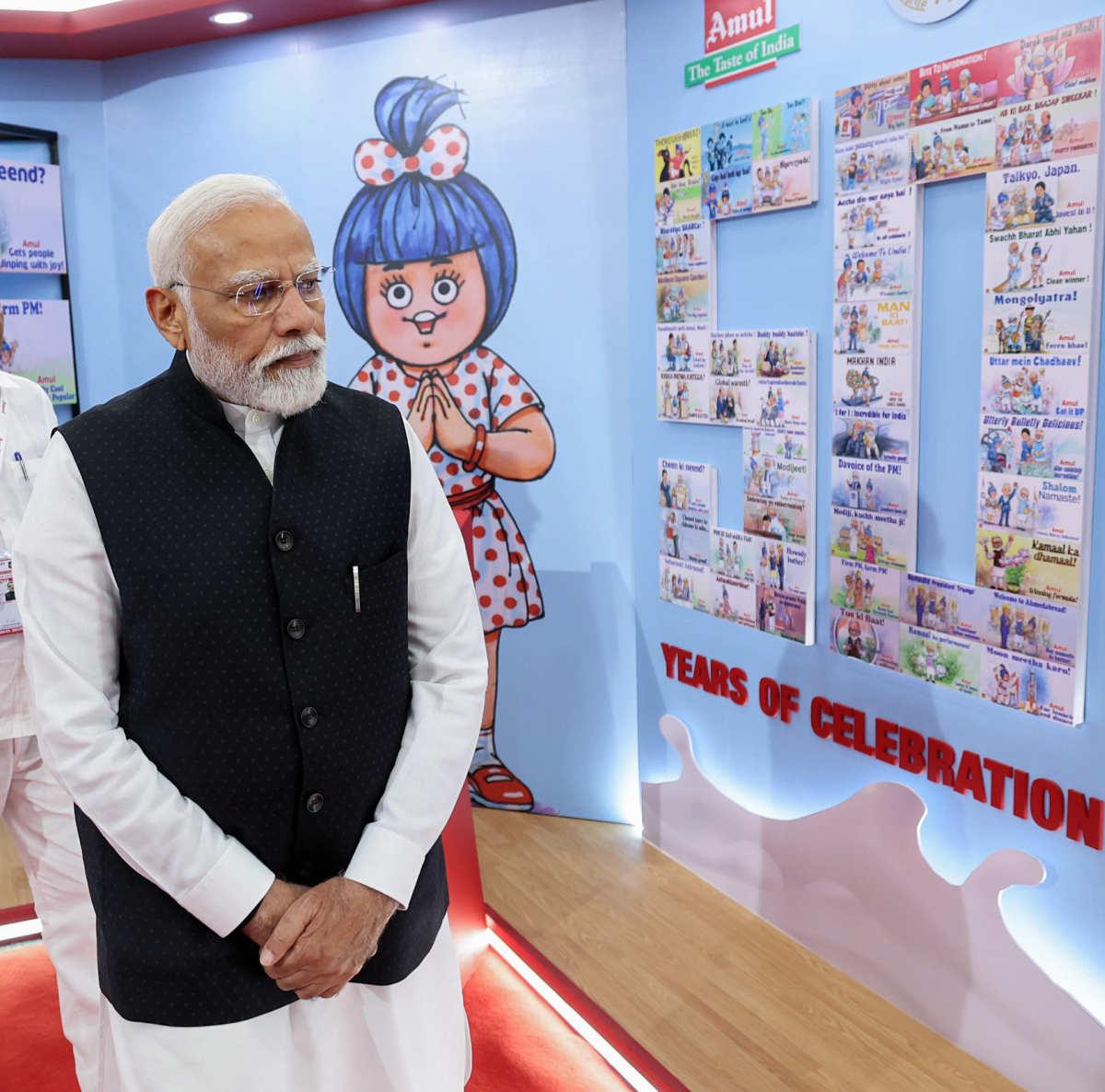By 10 am, Rakshit N Jagdale is already deep into the rhythm of the day, which promises to be a carousel of meetings, calls, and strategic decisions.

Photograph: Kind courtesy, Amrut
As managing director of Amrut Distilleries, he balances ritual and ambition, tradition and transformation, like many other legacy players in India’s alcoholic beverages sector who are staring at a rosy future.
The country’s alcobev sector is in high spirits.
According to a report by the International Spirits and Wines Association of India, which represents national and international premium spirits and wine brands, the industry’s value was pegged at $52.4 billion in 2021.
That figure is expected to touch $64 billion within five years, making India the fifth-largest contributor to global market revenues.
Given the opportunities, family-run alcobev companies are whipping up a cocktail of professionalisation, strategic partnerships, and global ambition.
Family & beyond
Take the case of Amrut, which was founded in 1948 by JN Radhakrishna Rao.
From its humble beginnings, the Bengaluru-based company gained global recognition under the leadership of Rao’s son, Neelakanta Rao Jagdale, who established a dedicated malt and grain distillery on Old Mysore Road in 1987.
Today, Rakshit N Jagdale, Neelakanta’s son and the third-generation leader, has taken the baton.
After completing his MBA at the University of Newcastle Upon Tyne, Rakshit joined the business, guided not only by legacy but by a personal passion for whisky.
His MBA thesis, focusing on the demand for single malt in Indian restaurants across the UK, planted the first seeds of Amrut’s international blueprint.
Whisky was less of an inheritance than a companion, Rakshit says.
Interest in the family business was nurtured amid the shadow of the distillery, with label-making and blend-talk at dinner fermenting dreams.
Joining the family business was simply a matter of when.
Today, Amrut has expanded its daily production capacity from 1,000 litres to 3,000, with plans to reach 4,000. Its products are now exported to the United States, Canada, the United Kingdom, and markets across Europe and Asia.
The company’s 83-brand portfolio targets premium and luxury segments.
Recently, Amrut Distilleries featured among the top 30 in the 2025 list of Drinks International’s ‘World’s Most Admired Whiskies’, securing the 27th position.
Rakshit is clear about the path ahead.
“If we want to grow aggressively, we have to look beyond the family, whether through private partnerships or joint ventures,” he says.
“Going public is also very much on the horizon, and there is already strong interest from other major IMFL (Indian-made foreign liquor) players.”
While partnerships are on his mind, the family’s next generation — his son and nieces, who are still studying — is also being integrated into the workings of the company.
Lunch, which is a modest, home-packed meal, is also a family affair, shared with his brother-in-law, joint managing director Thrivikram G Nikam.
Scaling in today’s competitive environment, however, demands more than familial succession, and he admits that family alone can’t fuel the next phase.
From jugaad to assembly lines
Far away from Bengaluru, up north in Jammu, is another story of legacy-meets-modernity. It’s the story of Devans Modern Breweries, which dates back to 1942, when Dewan Gian Chand built a small liquor retail and wholesale network in Jammu and Srinagar.
Some two decades later, in 1961, he founded Devans Modern Breweries.
At a time when few in northern India ventured into brewing, he positioned it as a progressive, modern brewery.
When Chand passed away in the 1980s, his son, Prem Dewan, took up the reins. Having joined the family brewery in the late 1970s as a 25-year-old law student, he was already deep into the business.
With polished assembly lines still a while away, those were the days of jugaad.
“We started bottling on a soda-water filling machine because proper beer-brewing equipment just wasn’t available,” he recalls.
Workers packed 24 glass bottles into coarse gunny bags, sealing them tightly before loading them onto rattling trucks.
“That was our version of distribution,” he says.
DeVans has come a long way since. In the late 1990s, Prem’s son, Ujjawal, began overseeing sales and a production tie-up in Rajasthan, while his twin brother, Uday, focused on exports from the Samba plant in Jammu.
The third generation’s distinct roles have helped deepen the company’s footprint.
Prem Dewan, who has helmed the business through decades of change, sees the transition as inevitable.
“In a year or two, both my sons will join the board,” he says with quiet confidence.
With 20 per cent growth last year and a 30 per cent target this fiscal, the company is aggressively scaling up.
A dark beer that has been two years in development is expected to hit the market by end-2025.
The company is also eyeing 12 additional production tie-ups to raise its total to 17. A public listing is planned within four years.
Retail roots to global reach

Photograph: NV/Facebook
Cut to New Delhi’s bustling lanes, where Ashok Jain’s modest retail unit, NV Group, which was launched in 1994, has metamorphosed into a distillery powerhouse, with a state-of-the-art facility at Ambala, inaugurated in 2008.
The portfolio has expanded too – from a Rs 100 label to bottles priced at Rs 5,000, with brands like Moja Matured XXX Rum, Brande XO, Mohulo Gin under its umbrella.
The group supplies to markets like the US, Singapore, the United Arab Emirates, Ghana, and Namibia.
Domestically, it has presence in Haryana, Punjab, and Goa, with plans to enter Kerala, Tamil Nadu, and West Bengal, among others.
“My father worked in the warehouse, so conversations about the industry were always in the air,” recalls Ashok Jain, chairman of NV Group.
“I began tagging along to the office when I was very young, at first just to idle around.
“But somewhere along the way, it drew me in — the brands, the creativity, the sense of building something.”
For his son, Varun Jain, the third-gen entrepreneur, every morning kicks off the same way: with sales.
“Everything starts there,” he says. “The targets, the focus, the drive — it is all sales-led.”
Thereon, his day unravels into a blur of meetings, market visits, distributor check-ins, business trips, and relentless follow-ups.
It is a schedule that rarely pauses, so there are no “off” days.
His fondest memories are not of boardrooms but of construction sites, watching his family’s bottling plant rise while he was in school, and a distillery flourish by the time he was in college.
An internship at Bacardi gave him an opportunity to closely study the global alcobev giant.
It helped him crystallise his mission: to not just sell liquor, but to elevate it to an experience.
He returned to NV and launched Smoke Lab Vodka, a leap into premiumisation and international markets.
“Smoke Lab was really the first step in taking the business beyond domestic boundaries,” he says.
New labels from the group, like Mohulo Gin, are building on that trajectory.
For Varun, the future of the family business lies in breaking away from the insular comfort of kinship and embracing the rigour of corporate governance or private partnership.
“If you want a global footprint and recognition, you can not shy away from change.
“Whether you like it or not, it has to be professionally run,” he says.
That shift, he says, is underway. Inspired by multinationals, the company is looking to adopt a professional structure, adding seasoned executives, independent directors, and diverse talent from within and beyond.
“It cannot just be my father and I making all the decisions anymore,” he says.
“To grow, you need the right people on board.”
The contours of India’s legacy alcobev sector are clearly shifting.
In a market poised for robust growth, the message is clear: The old guard may still raise the first toast, but the future will be brewed with professionalism.




